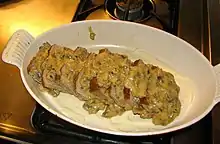Soubise sauce
Soubise sauce is an onion sauce. Soubise sauce was originally a slow-cooked onion and butter mixture used with various meats, game, poultry and vegetables dating back to the 1850s. Over the years, and through the hands of many chefs, it now has many variations. The simplest contains 3 ingredients, not counting salt and pepper.
 Preparation of veal Orloff. The veal is covered by a soubise-mushroom sauce. | |
| Type | Sauce |
|---|---|
| Main ingredients | Butter, onions |
The French version is either thickened with Béchamel sauce, or with cooked rice, ground in a Mortar and pestle.[1]
History
According to an 1872 issue of Victoria Magazine the sauce takes it name from the Prince de Soubise.[2] It is one of the sauces known from collection of Auguste Escoffier, made by adding a thickened béchamel to butter-stewed onions. To make a variation with rice and bacon fat instead of béchamel, Escoffier suggests to gently cook a high starch rice (such as Carolina rice) with fatty bacon, onions and white consommé, then purée the onions and rice before finishing with the usual butter and cream. Tomato purée seasoned with paprika or curry can be added to either variation, but Escoffier notes that béchamel is preferred to rice for its smoother consistency.[3]
19th-century Anglo-Italian cook Charles Elmé Francatelli serves the sauce over boiled pheasant with potato croquettes.[4]
Eliza Acton, who said soubise was "the finest kind of onion sauce", serves it with lamb, suggesting any rich gravy or brown cucumber sauce as a substitute. It is among the sauces she recommends to be served with Veal Fricandeau. Her recipe for English soubise replaces the béchamel with rich veal gravy finished with cream.
References
- Escoffier, Auguste (1846-1935) Auteur du texte (1912). Le guide culinaire : aide-mémoire de cuisine pratique (3e édition) / par A. Escoffier ; avec la collaboration de MM. Philéas Gilbert et Émile Fétu.
- Victoria Magazine - Volume 20 - Page 270
- Escoffier, Auguste. A Guide to Modern Cookery - Part I.
- Francatelli, Charles Elmé (1862). The Cook's Guide, and Housekeeper's & Butler's Assistant: A Practical Treatise on English and Foreign Cookery in All Its Branches.